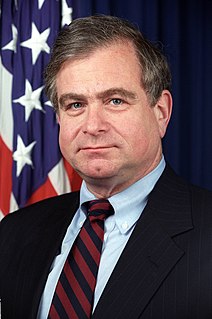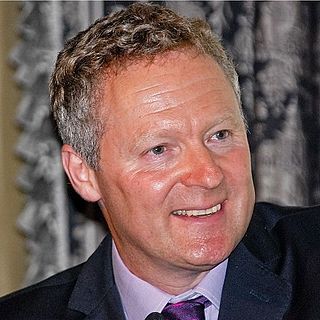A Quote by William J. Clinton
The community of nations may see more and more of the very kind of threat Iraq poses now: a rogue state with weapons of mass destruction, ready to use them or provide them to terrorists. If we fail to respond today, Saddam and all those who would follow in his footsteps will be emboldened tomorrow.
Related Quotes
In the 21st Century, the community of nations may see more and more of this very kind of threat that Iraq poses now - a rogue state with biological and chemical weapons. If we fail to respond, Saddam and all those who follow will believe that they can threaten the security of a vital region with impunity. But if we act now as one, we will send a clear message to would-be tyrants and terrorists that we will do what it takes to protect our security and our freedom in this new era.
Heavy as they are, the costs of action must be weighed against the price of inaction. If Saddam defies the world and we fail to respond, we will face a far greater threat in the future. Saddam will strike again at his neighbors; he will make war on his own people. And mark my words, he will develop weapons of mass destruction. He will deploy them, and he will use them.
For the last eight years, American policy toward Iraq has been based on the direct threat Saddam poses to international security. That threat is clear. Saddam's history of aggression leaves little doubt that he would resume his drive for regional domination and his quest for weapons of mass destruction if he had the chance.
Imagine the consequences if Saddam fails to comply and we fail to act. Saddam will be emboldened, believing the international community has lost its will. He will rebuild his arsenal of weapons of mass destruction. And some day, some way, I am certain, he will use that arsenal again, as he has ten times since 1983.
Hawks favor war on the grounds that Saddam Hussein is reckless, tyrannical and instinctively aggressive, and that if he comes into possession of nuclear weapons in addition to the weapons of mass destruction he already has, he is likely to use them or share them with terrorists. The threat of mass death on a scale never before seen residing in the hands of an unstable madman is intolerable – and must be preempted.
Iraq does pose a serious threat to the stability of the Persian Gulf and we should organize an international coalition to eliminate his access to weapons of mass destruction. Iraq's search for weapons of mass destruction has proven impossible to completely deter and we should assume that it will continue for as long as Saddam is in power.
Without question, we need to disarm Saddam Hussein. He is a brutal, murderous dictator, leading an oppressive regime ... He presents a particularly grievous threat because he is so consistently prone to miscalculation ... And now he is miscalculating America's response to his continued deceit and his consistent grasp for weapons of mass destruction ... So the threat of Saddam Hussein with weapons of mass destruction is real.
Our President feels, and apparently many in the United Nations Security Council feel, that it is necessary to disarm Iraq before Iraq can again use weapons of mass destruction on her neighbors or she makes some liaison with terrorists who will use these weapons either against Iraq's neighbors or ourselves.
It is inherently dangerous to allow a country, such as Iraq, to retain weapons of mass destruction, particularly in light of its past aggressive behaviour. If the world community fails to disarm Iraq we fear that other rogue states will be encouraged to believe that they too can have these most deadly of weapons to systematically defy international resolutions and that the world will do nothing to stop them.
America has shown we are serious about removing the threat of weapons of mass destruction... We now know that Saddam Hussein had the capacity to produce weapons of mass destruction.... We know he had the necessary infrastructure because we found the labs and the dual-use facilities that could be used for these chemical and biological agents. We know that he was developing the delivery systems - ballistic missiles - that had been prohibited by the United Nations.
What if [Saddam] fails to comply and we fail to act, or we take some ambiguous third route, which gives him yet more opportunities to develop this program of weapons of mass destruction? ... Well, he will conclude that the international community has lost its will. He will then conclude that he can go right on and do more to rebuild an arsenal of devastating destruction. And some day, some way, I guarantee you he'll use the arsenal.
If Saddam's regime and survival are threatened [by invasion], he will have nothing to lose, and may use everything at his disposal... If weapons of mass destruction land on Israeli soil, killing innocent civilians, the experts I have consulted believe Israel will retaliate, and possibly with nuclear weapons... Nor can we rule out the possibility that Saddam would assault American forces with chemical or biological weapons.
The threat of Saddam Hussein with weapons of mass destruction is real, but as I said, it is not new. It has been with us since the end of that war, and particularly in the last 4 years we know after Operation Desert Fox failed to force him to reaccept them, that he has continued to build those weapons. He has had a free hand for 4 years to reconstitute these weapons, allowing the world, during the interval, to lose the focus we had on weapons of mass destruction and the issue of proliferation.




























